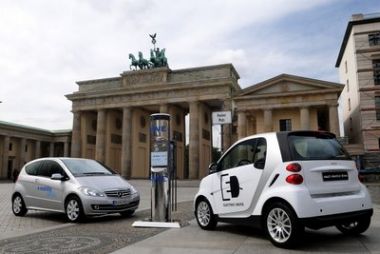
Electric cars, a recharging point, and Berlin's Brandenburg Gate
A large-scale trial of plug-in hybrid cars has begun in London, matching an existing scheme in Paris. An even larger scheme with all-electric cars is set to start in Berlin next year, to complete a trio of European capitals testing the technologies.
Toyota and EDF Energy launched a scheme on 10 September, which should see EDF Energy workers use a new-model plug-in Toyota Prius for their everyday travel. The cars can be connected to the grid through a normal plug socket at any of 40 charging stations EDF Energy has already installed around London, while more are planned.
EDF Energy is the UK subsidiary of Electricité de France (EdF), national supplier of that country and owner of 58 power reactors. Although EDF Energy's power currently comes from coal- and gas-fired power stations, a deal is in the works for it to be massively involved in the project to replace Britain's nuclear reactors.
Another development in the last year has been a plan to introduce fully-electric taxis on London streets, while a very similar arrangement between Toyota and EdF in Paris began last September.
Separately, Germany's largest power generator RWE - which operates five reactors - will provide some 500 charging points at homes and workplaces as well as public places in Berlin. This is part of a deal with Daimler, who are providing 100 all-electric cars from Mercedes-Benz and Smart.
Dieter Zetsche, chair of Daimler, said the program was "a good example of what can be achieved when policy makers, energy suppliers and the automotive industry all work together," before adding, "We invented the automobile and now we're reinventing it."
Lithium-ion batteries are being used in both new schemes, while Daimler boast that theirs will even be able to sell power back to the grid during the peak hours when the vehicle is not in use.
Nuclear powered cars
A large scale switch to electric transportation would have the potential to almost double the demand for low-carbon energy in a given market. This, combined with the flattening-out of daily demand from advanced grid use, as Daimler describes, would create powre curves ideal for very large scale deployment of new nuclear power plants.
The Toyota project in London was covered by the BBC under the tagline 'Nuclear or petrol'. Using a large proportion of nuclear power in your grid mix, EdF chair Vincent de Rivaz told the BBC, carbon reductions could be as high as 70% compared to fossil-fuelled engines. This compares to the 40% reduction in carbon dioxide EDF Energy said their new cars would give at the moment.







_97013.jpg)






